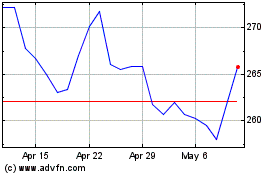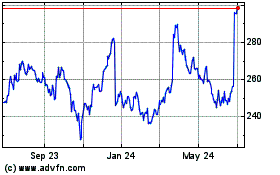By Jennifer Smith
This article is being republished as part of our daily
reproduction of WSJ.com articles that also appeared in the U.S.
print edition of The Wall Street Journal (April 14, 2018).
More big trucking companies are looking to cash in on home
delivery of bulky items as consumers grow more comfortable shopping
online for furniture and other goods too big for conventional
parcel networks.
Ryder System Inc. is the latest operator to jump into the
business, paying $120 million this month to buy MXD Group, a
logistics firm that specializes in "final mile" delivery of big
items to consumers' doorsteps.
The deal extends Ryder's bid to move into areas beyond its
well-known truck-leasing business, and reflects the growing
attraction of a sector that has been transformed by e-commerce.
Shoppers accustomed to getting online purchases in days, not
weeks, and tracking those packages, now look for similar service
when they buy big items like couches, washing machines and exercise
equipment. Such objects often require installation or special
handling, and may not fit in the highly automated systems that
carriers like United Parcel Service Inc. and FedEx Corp. use to
sort millions of packages each day.
That has drawn in large trucking operators who want to use their
scale to lure large retailers as customers for home-delivery
services.
Furniture is one of the fastest-growing segments of U.S. online
retail, with Amazon.com Inc., Wayfair Inc. and other e-commerce
firms competing for market share with big-box stores and furniture
chains like Crate and Barrel.
"Last-mile has taken off like crazy," says Daniel Sayne,
director of sales at Fidelitone Inc., which delivers furniture for
Amazon, Wayfair, and others. Newer entrants to the segment include
Green Bay, Wis.-based Schneider National Inc., one of the largest
U.S. truckload operators, as well as Richmond, Va.-based
less-than-truckload carrier Estes Express Lines.
Home delivery poses big challenges for trucking companies,
however.
Operators with business models built on delivering goods by the
pallet or truckload to industrial loading docks must send drivers
on irregular routes down residential streets to hit specific
delivery times. Workers may have to enter homes and take the time
to install products.
"Home delivery is more finicky, more risky and more costly,"
said Paul Thompson, chairman of Transportation Insight LLC, a
supply-chain management and logistics firm. "To really have a
cost-efficient last-mile network, you have to have density."
For the trucking companies, however, the service helps them move
into one area in the retail world that is growing rapidly as
digital sales carve away business from brick-and-mortar stores.
"Our strategy is to penetrate all six of those big-box retailers
that have a lot of density and a lot of delivery on big and bulky
products," Nicholas Hobbs, president of dedicated contract services
at J.B. Hunt Transport Services Inc., said at an investor
conference last month.
J.B. Hunt, which has long offered last-mile delivery to
customers such as appliance-maker Whirlpool Inc., expanded its
reach last year by buying provider Special Logistics Dedicated LLC
for $136 million. The company expects between $300 million to $350
million in final-mile revenue this year, up from about $250 million
in 2017.
Ryder was already doing a small number of consumer deliveries
for customers in its supply-chain and dedicated trucking segments.
The MXD deal gives Ryder a national network of 109 e-commerce
fulfillment facilities, including 21 cross-docking hubs. The
carrier also inherits MXD's customers -- retailers selling
furniture and appliances online and by catalog -- providing an
opportunity for selling those companies other Ryder services.
"We saw this as a space where we could be a leader," Ryder Chief
Executive Robert Sanchez said in an interview. "Customers that we
are currently running distribution centers for, customers where
we're doing delivery to retail stores, this is another piece of
that puzzle."
XPO Logistics Inc., the U.S. market leader in big-and-bulky home
delivery, is now rolling that service out in Europe, where many
urban consumers lack cars and depend on delivery to get big
purchases such as refrigerators home.
Much of the sector is made up of smaller carriers. Bigger fleets
often rely on a combination of company trucks and networks of
contractors to deliver bulky goods across wide swaths of the
country.
Noël Perry, a transportation economist and principal at
consulting firm Transport Futures, estimates the final-mile market
for bulky items, currently about $3.7 billion to $4 billion, will
expand to about $12 billion over the next decade. That's still just
a niche in a U.S. trucking industry that counts around $676 billion
in annual gross freight revenue.
"It's too early for this kind of thing to have the kind of
growth or profitability that acquirers are expecting," said Mr.
Perry.
Write to Jennifer Smith at jennifer.smith@wsj.com
(END) Dow Jones Newswires
April 14, 2018 02:47 ET (06:47 GMT)
Copyright (c) 2018 Dow Jones & Company, Inc.
FedEx (NYSE:FDX)
Historical Stock Chart
From Mar 2024 to Apr 2024

FedEx (NYSE:FDX)
Historical Stock Chart
From Apr 2023 to Apr 2024
